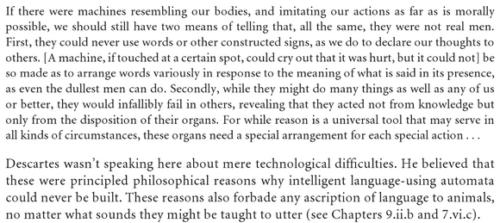Keith Gunderson, a pioneering philosopher of robotics, in his 1964 paper called “Descartes, La Mettrie, Language and Machines” captured this Robert Stoothoff translation of the 1637 Discourse:
If there were machines which bore a resemblance to our bodies and imitated our actions as closely as possible for all practical purposes, we should still have two very certain means of recognizing that they were not real men. The first is that they could never use words, or put together signs, as we do in order to declare our thoughts to others. For we can certainly conceive of a machine so constructed that it utters words, and even utters words that correspond to bodily actions causing a change in its organs… but it is not conceivable that such a machine should produce different arrangements of words so as to give an appropriately meaningful answer to whatever is said in its presence, as the dullest of men can do. Secondly, even though some machines might do some things as well as we do them, or perhaps even better, they would inevitably fail in others, which would reveal that they are acting not from understanding, but only from the disposition of their organs. For whereas reason is a universal instrument, which can be used in all kinds of situations, these organs need some particular action; hence it is for all practical purposes impossible for a machine to have enough different organs to make it act in all the contingencies of life in the way in which our reason makes us act.
Here is another translation:
…if there were machines which had the organs and the external shape of a monkey or of some other animal without reason, we would have no way of recognizing that they were not exactly the same nature as the animals… The first of these is that they would never be able to use words or other signs to make words as we do to declare our thoughts to others. For one can easily imagine a machine made in such a way that it expresses words, even that it expresses some words relevant to some physical actions which bring about some change in its organs … but one cannot imagine a machine that arranges words in various ways to reply to the sense of everything said in its presence, as the most stupid human beings are capable of doing. The second test is that, although these machines might do several things as well or perhaps better than we do, they are inevitably lacking in some other, through which we discover that they act, not by knowledge, but only by the arrangement of their organs. For, whereas reason is a universal instrument which can serve in all sorts of encounters, these organs need some particular arrangement for each particular action. As a result of that, it is morally impossible that there is in a machine’s organs sufficient variety to act in all the events of our lives in the same way that our reason empowers us to act.
And another one:
